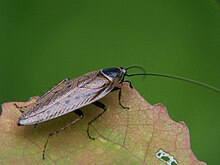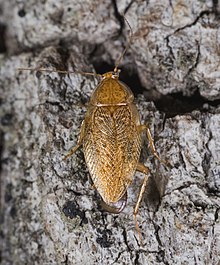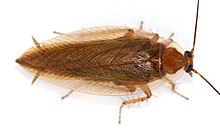Ectobius
| Ectobius | |
|---|---|

| |
| Ectobius pallidus | |
| Scientific classification | |
| Kingdom: | Animalia |
| Phylum: | Arthropoda |
| Class: | Insecta |
| Order: | Blattodea |
| Family: | Ectobiidae |
| Subfamily: | Ectobiinae |
| Genus: | Ectobius Stephens, 1835 |
| Species | |
|
See article text | |
Ectobius is a genus of non-cosmopolitan cockroaches once thought native to the Old World and described by Stephens in 1835,[1] belonging to the family Ectobiidae, subfamily Ectobiinae.[2] The discovery[3] of 4 ectobius cockroaches in Colorado dating to 49 Million years ago suggests the genus actually originated in North America. This genus has been subject to a number of revisions.[4][5]
Description[]

The adult 'cockroaches' reach 6–12 millimetres (0.24–0.47 in) of length, the basic coloration of their body is mostly brown or yellowish, with a clearer margin.
The females are usually bigger than the males and have shorter wings, while in the males wings cover at least the whole abdomen.
Distribution[]
Species of this genus are mainly present in most of Europe, Africa, in eastern Palearctic realm and the Near East. The "lesser cockroach" (i.e. as found in Britain), previously placed here, is now in the genus Capraiellus.[5]
The genus was long absent from the North American continent until recent re-introductions of some cool-adapted species in the Canadian Maritimes and North Eastern, US.[6]
Species[]




The Cockroach Species File lists:[2]
- Bohn, 2013
- subgenus Ectobiola Uvarov, 1940 (synonym Ectobiella Adelung, 1917)
- Adelung, 1906
- subgenus Ectobius Stephens, 1835
- Failla & Messina, 1974
- (Shelford, 1910)
- Ramme, 1927
- Saussure, 1899
- (Brunner von Wattenwyl, 1861)
- Rehn, 1931
- Failla & Messina, 1979
- Ramme, 1923
- Seoane, 1879
- Adelung, 1917
- Ramme, 1923
- Rehn, 1931
- Bey-Bienko, 1950
- Harz, 1977
- Burr, 1898
- Failla & Messina, 1974
- Princis, 1963
- Bey-Bienko, 1963
- Failla & Messina, 1982
- Bey-Bienko, 1938
- Failla & Messina, 1981
- Rehn, 1931
- (Hanitsch, 1937)
- Bolívar, 1907
- Rehn, 1931
- Rehn, 1931
- Bey-Bienko, 1936
- Ramme, 1923
- Failla & Messina, 1981
- Ectobius lapponicus (Linnaeus, 1758) - type species (as Blatta lapponica L. = Ectobius lapponicus lapponicus)
- Rehn, 1931
- Rehn, 1931
- (Rehn, 1922)
- Harz, 1983
- (Hagenbach, 1822)
- Rehn, 1931
- Failla & Messina, 1978
- Costa, 1866
- Shelford, 1911
- Rehn, 1931
- Ectobius pallidus (Olivier, 1789)
- Chopard, 1958
- Failla & Messina, 1974
- Bey-Bienko, 1936
- Ramme, 1922
- Bey-Bienko, 1967
- Bohn, 1989
- Rehn, 1926
- Baccetti, 1991
- Failla & Messina, 1976
- Bey-Bienko, 1935
- Ramme, 1949
- (Shelford, 1910)
- Rehn, 1931
- Bey-Bienko, 1936
- Bohn, 2004
- Ectobius sylvestris (Poda, 1761)
- Bey-Bienko, 1935
- Rehn, 1931
- Bohn, 2004
- Ramme, 1923
- Galvagni, 1978
- Failla & Messina, 1973
- Failla & Messina, 1974
- Ectobius vittiventris (Costa, 1847)
- Failla & Messina, 1980
References[]
- ^ Stephens (1835) Illustrations of British Entomology. Mandibulata. Baldwin & Cradock, London, vol. VII, p. 1–306.
- ^ a b Cockroach Species File (retrieved 6 January 2021)
- ^ "After a 49-million-year hiatus, a cockroach reappears in North America". phys.org. Retrieved 2021-06-28.
- ^ Bohn, H. 1989: Revision of the sylvestris group of Ectobius Stephens in Europe (Blattaria: Blattellidae). Entomologica Scandinavica, 20: 317–342.
- ^ a b Bohn (2013) In Bohn, Beccaloni, Dorow & Pfeifer. Another species of European Ectobiinae travelling north – the new genus Planuncus and its relatives (Insecta: Blattodea: Ectobiinae). Arthropod Systematics & Phylogeny 71(3): 147.
- ^ Vršanský, P.; Oružinský, R.; Barna, P.; Vidlička, L'.; Labandeira, C. C. (2014). "Native Ectobius (Blattaria: Ectobiidae) From the Early Eocene Green River Formation of Colorado and Its Reintroduction to North America 49 Million Years Later". Annals of the Entomological Society of America. 107 (1): 28–36. doi:10.1603/AN13042. ISSN 0013-8746.
External links[]
- Cockroach genera